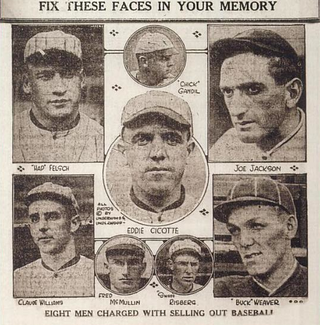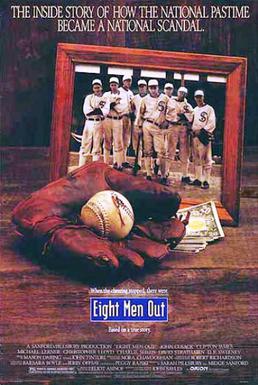
The Chicago White Sox are an American professional baseball team based in Chicago. The White Sox compete in Major League Baseball (MLB) as a member club of the American League (AL) Central division. The team is owned by Jerry Reinsdorf, and plays its home games at Guaranteed Rate Field, located on Chicago's South Side. The White Sox are one of two MLB teams based in Chicago, the other being the Chicago Cubs of the National League (NL) Central division.

Joseph Jefferson Jackson, nicknamed "Shoeless Joe", was an American outfielder who played Major League Baseball (MLB) in the early 1900s. Although his .356 career batting average is the third highest in the history of Major League Baseball (MLB), he is often remembered for his association with the Black Sox Scandal, in which members of the 1919 Chicago White Sox participated in a conspiracy to fix the World Series. As a result, Commissioner Kenesaw Mountain Landis banned Jackson from baseball after the 1920 season. During the World Series in question, Jackson had led both teams in several statistical categories and set a World Series record with 12 base hits. Jackson's role in the scandal, his banishment from the game, and his exclusion from the Baseball Hall of Fame have been fiercely debated.

Harry Herbert Frazee was an American theatrical agent, producer, and director, and owner of Major League Baseball's Boston Red Sox from 1916 to 1923. He is well known for selling Babe Ruth to the New York Yankees, which started the alleged Curse of the Bambino.

The Curse of the Bambino was a superstitious sports curse in Major League Baseball (MLB) derived from the 86-year championship drought of the Boston Red Sox between 1918 and 2004. The superstition was named after Babe Ruth, colloquially known as "The Bambino", who played for the Red Sox until he was sold to the New York Yankees in 1920. While some fans took the curse seriously, most used the expression in a tongue-in-cheek manner.

A curse is any expressed wish that some form of adversity or misfortune will befall or attach to one or more persons, a place, or an object. In particular, "curse" may refer to such a wish or pronouncement made effective by a supernatural or spiritual power, such as a god or gods, a spirit, or a natural force, or else as a kind of spell by magic or witchcraft; in the latter sense, a curse can also be called a hex or a jinx. In many belief systems, the curse itself is considered to have some causative force in the result. To reverse or eliminate a curse is sometimes called "removal" or "breaking", as the spell has to be dispelled, and often requires elaborate rituals or prayers.

The Black Sox Scandal was a Major League Baseball game-fixing scandal in which eight members of the Chicago White Sox were accused of throwing the 1919 World Series against the Cincinnati Reds in exchange for money from a gambling syndicate led by Arnold Rothstein. As a response, the National Baseball Commission was dissolved and Judge Kenesaw Mountain Landis was appointed to be the first Commissioner of Baseball, and given absolute control over the sport to restore its integrity.
A sock is a piece of clothing worn on the foot.

The Cubs–White Sox rivalry refers to the Major League Baseball (MLB) geographical rivalry between the Chicago Cubs and Chicago White Sox. The Cubs are a member club of MLB's National League (NL) Central division, and play their home games at Wrigley Field, located on Chicago's North Side. The White Sox are a member club of MLB's American League (AL) Central division, and play their home games at Guaranteed Rate Field, located on Chicago's South Side.

The 2004 World Series was the championship series of Major League Baseball's (MLB) 2004 season. The 100th edition of the World Series, it was a best-of-seven playoff between the American League (AL) champion Boston Red Sox and the National League (NL) champion St. Louis Cardinals; the Red Sox swept the Cardinals in four games. The series was played from October 23 to 27, 2004, at Fenway Park and Busch Memorial Stadium, broadcast on Fox, and watched by an average of just under 25.5 million viewers. The Red Sox's World Series championship was their first since 1918, ending the Curse of the Bambino.

The 1918 World Series was the championship series in Major League Baseball for the 1918 season. The 15th edition of the World Series, it matched the American League champion Boston Red Sox against the National League champion Chicago Cubs. The Red Sox beat the Cubs four games to two. The Series victory for the Red Sox was their fifth in five tries, going back to 1903. The Red Sox scored only nine runs in the entire Series, the fewest runs by the winning team in World Series history. Along with the 1906 and 1907 World Series, the 1918 World Series is one of only three Fall Classics where neither team hit a home run.

Eight Men Out is a 1988 American sports drama film based on Eliot Asinof's 1963 book Eight Men Out: The Black Sox and the 1919 World Series. It was written and directed by John Sayles. The film is a dramatization of Major League Baseball's Black Sox Scandal, in which eight members of the Chicago White Sox conspired with gamblers to intentionally lose the 1919 World Series. Much of the movie was filmed at the old Bush Stadium in Indianapolis, Indiana.

Richard Henry Kerr was an American professional baseball pitcher for the Chicago White Sox of Major League Baseball. He also served as a coach and manager in the minor leagues.
The Jamestown Red Sox were an integrated semi-professional baseball team based in Jamestown, North Dakota, in the 1930s.
Sox most often refers to:
The Curse of the Black Sox (1919–2005) was a superstition or "scapegoat" cited as one reason for the failure of the Chicago White Sox to win the World Series from 1917 until 2005. As with other supposed baseball curses, such as the crosstown Chicago Cubs' Curse of the Billy Goat (1945–2016), or the Boston Red Sox' Curse of the Bambino (1918–2004), these "curses" have been publicized by the popular media over the course of time.

The Curse of the Colonel refers to a 1985 Japanese urban legend regarding a reputed curse placed on the Japanese Kansai-based Hanshin Tigers baseball team by the ghost of deceased KFC founder and mascot Colonel Sanders.
The 1920 Major League Baseball season was contested from April 14 to October 12, 1920. The Brooklyn Robins and Cleveland Indians were the regular season champions of the National League and American League, respectively. The Indians then defeated the Robins in the World Series, five games to two.
White Sox primarily refers to the Chicago White Sox, a professional baseball team.
The Boston Red Sox are a professional baseball team.

Harry Mitchell Grabiner was an American professional baseball executive. A 40-year employee of the Chicago White Sox, he served the team's owners—founding president Charles Comiskey, son and successor J. Louis Comiskey, and Lou’s widow, Grace—in a number of capacities, rising from peanut vendor to club secretary, business manager and vice president. He is often listed as the White Sox' first general manager, with a term lasting from as early as 1915 through 1945. After leaving the White Sox at the close of the 1945 season, he joined Bill Veeck’s ownership syndicate and became a vice president and minority stockholder with the Cleveland Indians from 1946 until his death in 1948.












